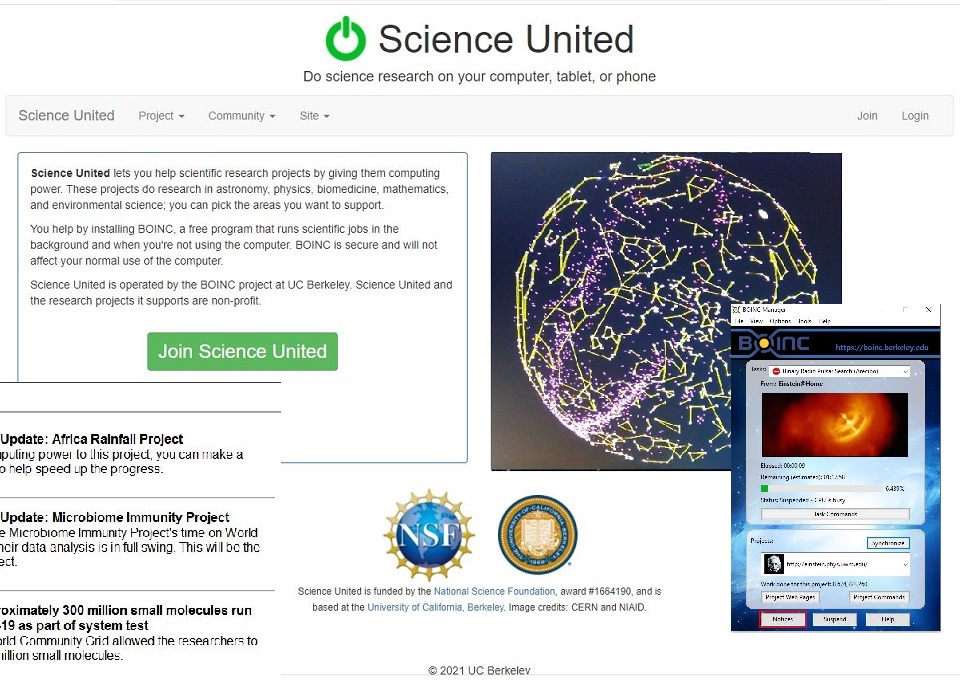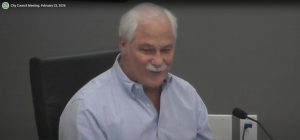Install, do nothing, contribute to research
6 min read
You can contribute to scientific research every time you step away from your computer.
Alex Bryan wants to help people contribute to scientific research every time they step away from their computers.
Alex Bryan: [00:00:07] I work in IT in my professional life, and so in my non-professional life, a lot of my hobby projects are also IT-related. And so this project Science United is a way for people to recycle, in essence, to use their spare computer power. The computer is just on sitting there not doing anything. It could be contributing towards scientific projects, researching cures for diseases research in climate models, researching different things in material science or astrophysics.
John Q: [00:00:34] Alex helps people install the software on their computers.
Alex Bryan: [00:00:39] I help people set this up on their machines cause maybe they’re not as technically adept and they want to have somebody else do it. And I explain to them how it all works. Science United is a really cool endeavor.
If you remember in the ’90s and the early 2000s, doing the Search for Extra Terrestrial Intelligence, doing, running SETI@Home, we’ve had that screensaver that would help you look at satellite data to help find signs of alien life, you’ve already interacted with Science United. Or at least, with the technology behind it, using the BOINC distributed computing network.
Thank you for supporting
local citizen journalism
And that stands for the Berkeley Open Infrastructure for Network Computing, the tool that all these projects use, again, to save the scientists. We don’t want researchers spending all the time writing computer code, right? So they build these tools that make their jobs easier. And BOINC is a tool that enables them to split up the work and send it out to thousands of computers and verify that the results are correct.
John Q: [00:01:24] In the winter, it can also heat your home.
Alex Bryan: [00:01:27] So it’s really cool. And if you’re running it in winter in Eugene, most people here have electric heat, right? Most people here don’t have gas furnaces. And so if you’re running, if you’re leaving your computer on just to run science projects, it ends up essentially being free because the energy that you use for your computer ends up heating your house and you would have spent that on regular, thermostat heat anyway. So it’s like this magic tool.
John Q: [00:01:50] Some people wonder if they can make a difference.
Alex Bryan: [00:01:53] And one, one more thing about kind of the, it, people always wonder okay, that sounds cool, what’s the impact that I can have as just one computer user, what does all this computation really doing? Just shooting into the dark or is there something actually useful about this computing?
And so early on in the pandemic, there’s a project called Rosetta@Home, and there’s been a number of scientific discoveries. I should say that, that have come as a result of this kind of work. But one of the more recent, more poignant ones this Rosetta At Home project, they do research on protein folding, which is basically when you make proteins, how are they shaped and how do they interact with other proteins than others?
And so early on in the pandemic, Rosetta@Home was really instrumental in developing the technology and the understanding of COVID to make the vaccine, which is really, that’s an amazing thing to think that by just leaving your computer on, you might help cure a disease. And as research on TB, and a bunch of other diseases as well, going on through BOINC projects. So it’s really powerful and fascinating stuff.
John Q: [00:02:45] Alex said the tool also builds trust.
Alex Bryan: [00:02:48] For me coming from the IT world, what I’m fascinated by in this project is the technical side of it. I’m fascinated by the fact that there’s all these computers sitting on that aren’t doing anything that could be contributing to some scientific project. But I think a more like nuanced, like, social benefit of software like this, is that it engages people with science. You’re more likely to trust scientists. You are more likely to care about science if you’re directly engaged with it, if you’re doing something to contribute to science development in the same way. When you’re young and you go to a zoo and you get to see creatures you’ve never seen before from other parts of the world, it gives you an appreciation for animal life and for nature, right? And then when you grew up later, you have these values that you care about the environment. So that’s a lot of where they come from. And so the same thing is true. If you’re using your computer to contribute to the development of a COVID vaccine, you’re going to be more likely to trust the COVID vaccine.
It’s this like soft way to get people involved in science and change the way that we interact, because otherwise it’s just these, like, scary people in lab coat somewhere far away.
John Q: [00:03:51] Alex said the tool fills an important niche.
Alex Bryan: [00:03:54] One of the things that distributed computing really brings to the table, as it, just think about it from a development of science perspective. A lot of times, if you want to get funding for research you need to have a particular product in mind that you’re going to make out of that research. You have to say, oh, we’ve discovered this new material, and we think we could make X, Y, Z with this material to make someone a billion dollars.
But before you get to that stage where you have a product in mind where you’ve researched something enough to understand how it could be to the consumer market, the business market, you have to do that fundamental research where you’re just looking at things and you’re tinkering with them and you’re putting them in different solutions and trying to figure out how they work. And that kind of tinkering is really difficult to fund. Nobody wants to throw money at that problem. And so a lot of that is what distributed computing helps out with, because we’re enabling these researchers who just want to get a better understanding of these technologies or these chemical chemicals, a. To do that kind of stimulation without needing huge grant money or the corporate backing.
John Q: [00:04:50] Distributed computing can also be used for fun projects.
Alex Bryan: [00:04:54] There’s all sorts of projects in all areas of science and there’s new products being added all the time, there’s even one. This won’t run if you run Science United, just to give you an example of a non-science kind of project that’s going on. If anyone here plays Minecraft, you know that when you start Minecraft, you get this this view of a particular Minecraft world in the demo view. And Minecraft worlds are generated based on seeds. You put it in some, a long string of letters and numbers and you get a particular world out of it. And so there’s a project to try all the letters and numbers and see what all the worlds are and define how this cactus can be generated, or the world with the most palm trees, so there’s all sorts of like fun and like those videos on YouTube, when they find these things, they get like millions of views and it’s silly, but also it’s a great example of the power of this kind of technology. It was a cool little project.
The Science United doesn’t run that, but that is a BOINC project that’s out there. Anything you’re interested in, there’s probably a BOINC project for it. And there’s been like, dozens of papers published on the data gathered from these these research projects. If you want to, if you want to learn more about the science behind it, each of those projects has a good educational section.
P.S. It’s easy to install, runs on Mac & Windows, and can be downloaded from scienceunited.org




